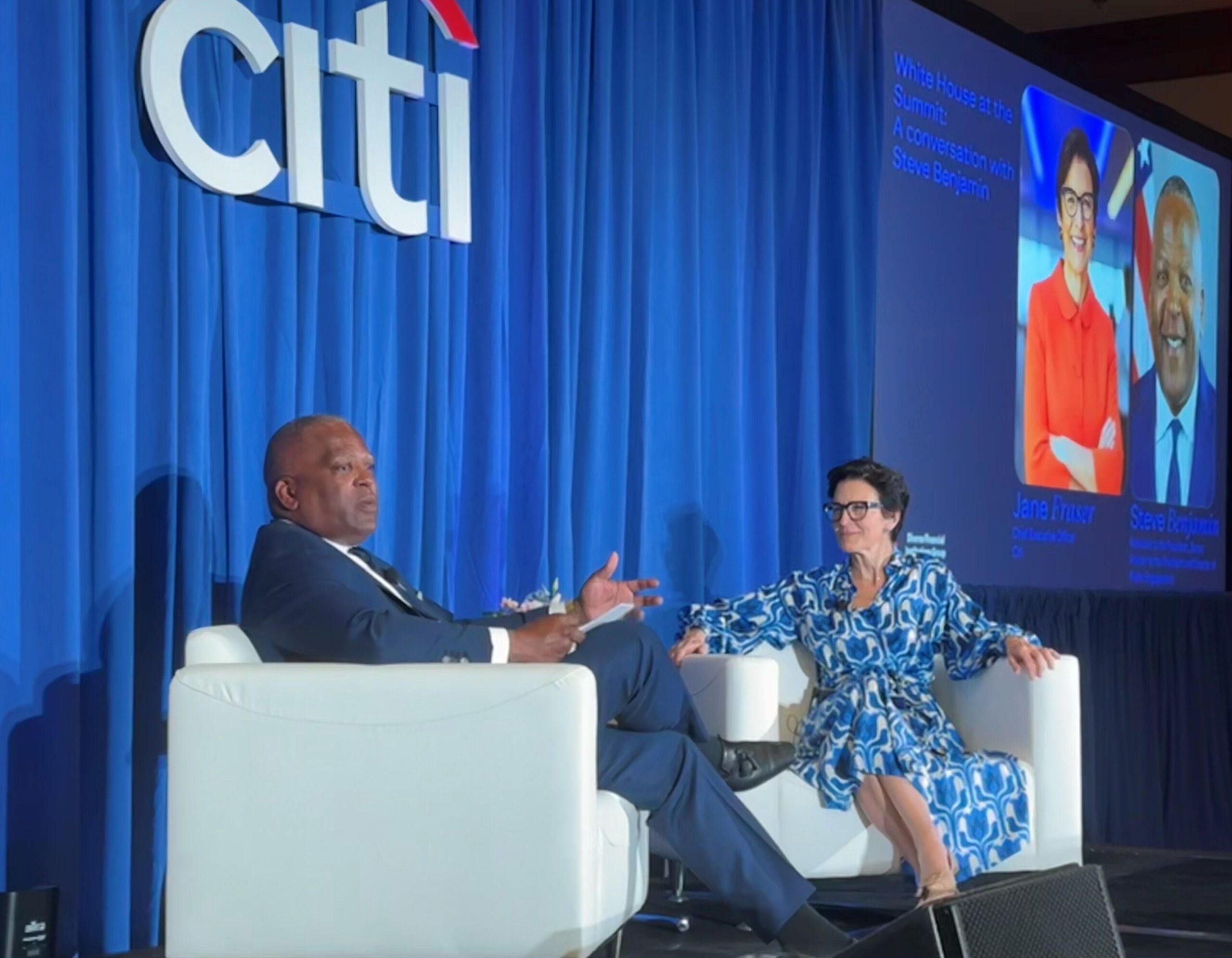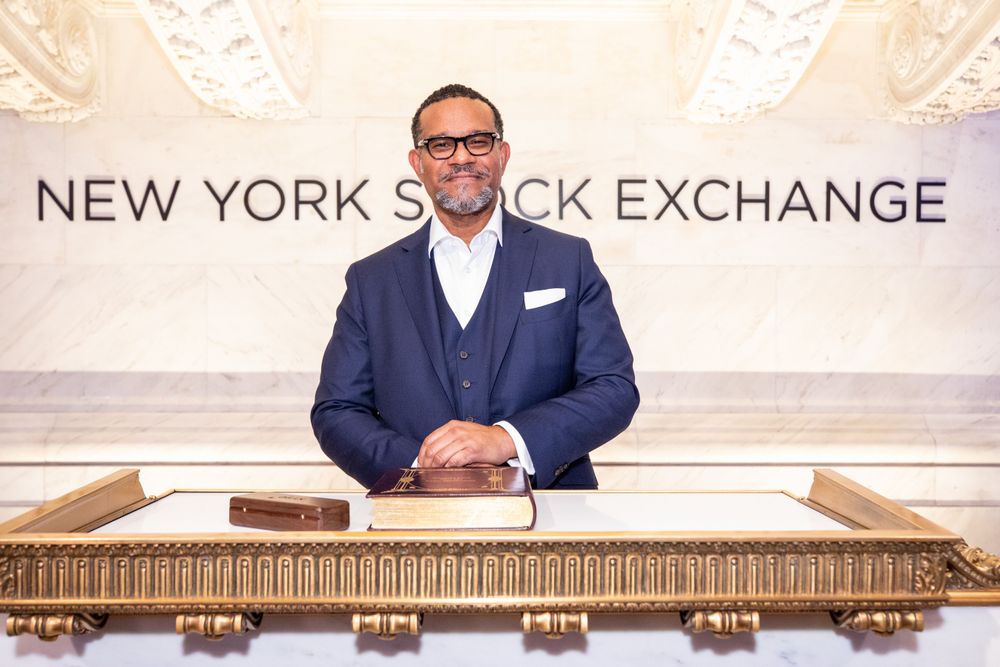Dear reader,
Welcome to the latest edition of The Forum File. In this edition, we are highlighting one bank’s work to help close the racial wealth gap and increase economic mobility for communities of color across the nation.
We hope you enjoy reading this edition and please do not hesitate to share your feedback.
Kevin Fromer, President and CEO, Financial Services Forum
Penny for Your Thoughts
Harold Butler is the head of Citi’s Diverse Financial Institutions Group
Why did Citi set up a specific group to lead its work with diverse financial institutions?
At Citi, our mission is to enable economic growth and progress. One of the most meaningful ways we are bringing this mission to life is through our commitment to help close the racial wealth gap and increase economic mobility for communities of color in the U.S.
I have the privilege of leading Citi’s Diverse Financial Institutions Group – also known as DFIG – which helps institutionalize our company’s commitment to racial equity and serves as a centralized hub to lead and expand our engagement with diverse financial institutions.
We know that diverse financial institutions are central to the financial services ecosystem. They are the trusted source of banking and access to capital for many communities across the country. At Citi, we are committed to supporting and strengthening these organizations to help scale this work.
How does DFIG fit into Citi’s approach to using business integration to help address the racial wealth gap?
We know from our own research that the mission of closing the racial wealth gap also presents great economic opportunity both for our country and for firms like Citi that lean into the upside. But we also knew making progress would require us to be intentional about our efforts and make a shift from a short-term, time-bound commitment to a longer-term outlook.
By integrating DFIG into Citi’s Markets business, we are enabling Minority Depository Institutions (MDIs) and diverse broker-dealers to get involved in transactions that will grow fee and interest income for these firms. DFIG connects them with the right people at Citi who can make introductions and open up the chance for these firms to play a role in certain capital markets transactions where they might not typically have access or exposure. Citi’s DFIG is unique among Wall Street firms in playing this type of role.
What brought you personally to this work?
I didn’t cut my teeth as a banker. I worked on the sales side in technology at Freddie Mac and Microsoft before transitioning to banking. A professional connection brought me to Citi and I’m a big believer in building a business or a career through relationships with trusted professionals.
I got into the DFIG work because we were trying to help one of Citi’s largest clients meet a goal it had related to inclusion for its suppliers. I saw a chance to leverage some of the relationships I cultivated over time to help our client achieve its goals. This helped to fuel what is now DFIG.
How has this work progressed over the last couple of years since Citi originally launched DFIG in 2022?
I know that the day-to-day engagements in Citi DFIG are contributing to closing the racial wealth gap. It is obviously going to take time, but we can feel things are changing. The 13 MDIs that Citi is supporting through equity investments are now positioned better than they’ve been in 40 years. That’s saying something.
We’ve learned a lot over the past few years about the challenges many underserved communities are facing. That information empowers us to think about how we do business differently. Banks are the heartbeat of communities. Much like the heart pumps blood to the different parts of the body, investments in communities act much the same way and banks are the catalyst for making that happen.
Value Add
Citi Convenes Executives and Policymakers for DFIG Summit

The second annual Citi DFIG Executive Summit brought together leaders from more than 80 MDIs and diverse broker dealers and asset managers at the Landsdowne Resort in Leesburg, Virginia, in early May. After launching the summit last year at Citi’s headquarters in New York, the second edition held closer to the nation’s capital enabled several policymakers to participate and share their perspectives on the government’s role in advancing this work.
Citi CFO Mark Mason kicked off the conversation in a fireside chat with U.S. Treasury Deputy Secretary Wally Adeyemo while Citi CEO Jane Fraser and Steve Benjamin, Senior Advisor to the President and Director of the White House Office of Public Engagement, spoke to attendees over lunch. Finally, U.S. Deputy Commerce Secretary Don Graves sat down with Jarryd Anderson, co-chair of the Financial Services Group at Paul, Weiss, to talk about the public-private partnership to advance economic growth.
Participants also heard from Citi leaders and other outside experts on industry trends, training platforms and innovative solutions to common challenges. Breakout sessions tailored to participant interests and social components of the programming fostered the networking and collaboration that are pillars of the DFIG approach.
This annual gathering serves to further drive Citi DFIG’s mission of working with our partners to create revenue-generating opportunities, share expertise, and drive an even greater impact in diverse communities.
Capital Gains
What we’re doing in Washington
In our latest BankNotes Blog, Forum Chief Economist and Head of Policy Research, Sean Campbell, examined how the Federal Reserve’s Financial Stability Report underscores the strength of the nation’s largest banks through their strong levels of capital and liquidity. “The Federal Reserve and other regulators should take stock of its own financial stability assessment as they chart the course for regulatory reform,” Campbell wrote.
The Forum released a fact sheet on Basel III Endgame’s impact on municipal bonds.
Our Two Cents
Research from the Forum
The Forum released its latest data on the value and strength of the nation’s largest banks.
Checking the Balance
Members in the news
Bank of America launched a new Access to Capital Connector, an online platform designed to connect entrepreneurs and small business owners to local Community Development Financial Institutions and other business support organizations.
BNY Mellon collaborated with Accenture, a leading professional services company, to modernize financial services offerings and help their joint clients drive growth.
Citi CEO Jane Fraser joined other business executives in a White House meeting with President Biden to discuss the economy with a focus on supporting businesses and workers.
Goldman Sachs held its fourth-annual Market Madness competition, a program dedicated to supporting students at Historically Black Colleges and Universities and granted $1 million to Spelman College.
JPMorgan Chase announced $20 million in new philanthropic funding to eight organizations across the U.S. working to expand homeownership opportunities for underserved communities. Additionally, the firm is expanding its Chase Home Lending program, increasing the homebuyer grant from $5,000 to $7,500 in 8,500 neighborhoods across the U.S.
Morgan Stanley announced a $20 million commitment over the next five years to its Alliance for Children’s Mental Health, bringing the firm’s total funding to $50 million since launch in 2020. The Alliance will strengthen its work delivering programming and research, as well as advancing solutions through its Innovation Awards.
State Street earned the Hispanic Equity at Work Bronze Certification and the renewal of its Black Equity at Work Bronze Certification by Management Leadership of Tomorrow, a non-profit dedicated to advancing racial equity in the workplace.
Wells Fargo Home Lending expanded its $10,000 Homebuyer Access grant program to additional communities in the eight metropolitan areas where the program was launched in 2023. This expansion provides greater opportunities for Black and Hispanic homebuyers and helps increase homeownership for underserved communities.
